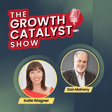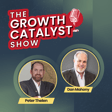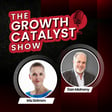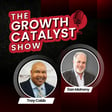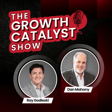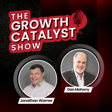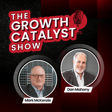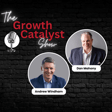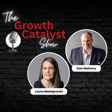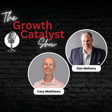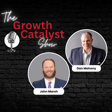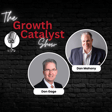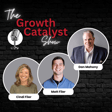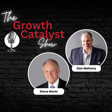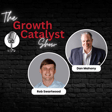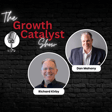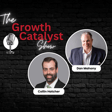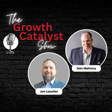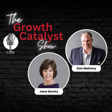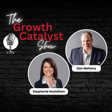Become a Creator today!Start creating today - Share your story with the world!
Start for free
00:00:00
00:00:01

Innovating in Office Tech: A Talk with Phil Van Gelder
Phil Van Gelder, co-founder of Atlanta Office Technologies, shares his journey from aspiring athlete to successful entrepreneur. Discover how his experience, sales strategies, and growth mindset have enabled him to excel in providing cutting-edge office solutions. Don't miss this engaging conversation, packed with valuable insights.
Transcript
Introduction to The Growth Catalyst Show
00:00:00
Speaker
Welcome to The Growth Catalyst Show, where we believe that growth can come in many forms, professional, personal, company, sales, you name it. I'm your host, Dan Mahoney, founder of Transcendent Sales Solutions and a guide to a world of growth possibilities. I've spent my career empowering companies and their people with strategies that accelerate growth.
00:00:18
Speaker
I'm here to bring you stories of these business leaders and their trusted advisors to gain insights into their journeys and learn how they fueled their own growth. Just maybe their journey could become part of your own growth story. Are you ready? Let's grow.
Phil Van Gelder's Professional Focus
00:00:34
Speaker
Welcome to the next edition of The Gross Catalyst Show. I'm your host, Dan Mahoney, and I am happy to have my next guest here today. Phil Van Gelder is a partner and co-founder of Atlanta Office Technologies with sales and services commercial office equipment, such as copiers, printers, and audio visual solutions. AOT is growing in a fundamentally sound way that requires profit and reinvestment, not just more zeros on the top line. They operate AOT with a mindset that
00:01:03
Speaker
Bigger is not better. Better is better. Phil, welcome to the Girls Catalyst Show. You know, I should get you to come over to my house and have you introduce me each morning to my wife, because that was way better than any other introduction I typically would get from someone. I'm glad to be here as we talk beforehand. I'm usually on the other side of this. So to have somebody take even a remote interest in
Phil's Journey: California to Indiana
00:01:27
Speaker
maybe one of the most boring industries in the world, I'll take that gladly. So thanks for having me.
00:01:33
Speaker
Well, and you're a warrior too, because we're literally one minute of this and you're already in trouble when your wife listens to it. I'm surprised it took that long. Yeah. We'll see how it goes, but we're off to a good start. This is awesome. Well, you know what? I'm excited to talk to you about today and learn about another Midwesterner. I am going to make the assumption that since you went to Indiana University, that you're from Indiana.
00:01:58
Speaker
I'm a bit of a geographic mutt. So I was born and raised in Southern California from the San Fernando Valley. So if you've ever heard the term or you've ever met that quote, ditzy blonde girl, so I'm getting in trouble here, the kind that kind of twirls her hair and does up speak where she's like, Dan, you know what I'm talking about? There's so many things. That's a valley girl. That's where I grew up.
00:02:19
Speaker
So I was born and raised there. My dad was a Californian his whole life. My mom was a pastor's kid. They moved out there. She met my dad. They got married. We ended up moving to Indiana. My dad relocated and everything when I was going into high school. So I finished high school in Indiana, went to Indiana University, graduated from there, and bounced around the Midwest a little bit, probably close to 10 to 12 years professionally before we came to Atlanta to start a business.
00:02:46
Speaker
A little bit of a circuitous route, not exactly straight from the cornfields of India. So you are a Hoosier because you went to Indiana University. I am. And we've not had much to brag about lately, so don't hold that against me. But yes, I have a degree on the wall that says I went there for four years.
00:03:07
Speaker
When you were going there, what was the plan when you started college?
A Dream of Sports Broadcasting
00:03:11
Speaker
All right. So I am somebody that is highly intentional. Like I don't do much of anything unless I've planned for it. So plan your work and work your plan type thing. Ever since I was a little kid born and raised in Los Angeles, I was going to be the first white Bo Jackson.
00:03:27
Speaker
I was obsessed with foam. I was going to play pro baseball, pro football. I'd fall asleep if you ever remember like the Hutch football uniforms that had like plastic helmets, plastic shoulder pads. I'd fall asleep at night. I was going to be a pro. Like I'm obsessed with sports, love to compete. But God didn't get that same message. I grew really late. I was as wide as I was tall. I didn't grow till high school. And then I stretched out and just became a string bean.
00:03:53
Speaker
And I said, oh, man, like all those hopes and dreams of being an athlete is gone. But I said, if I can't be on the field, I want to be near it. So I said, I'm going to be on broadcast journalism. I went to school to Indiana because I wanted to do ESPN. The plan was to graduate. I wanted to be Chris Fowler. I mean, what better job than to be at the biggest college football games every Saturday versus Chris Berman. Yeah, right, right, right.
00:04:19
Speaker
I was just gonna say, it's like the Husky overweight guy that like is fumbling, bumbling all the way to the goal line or Chris Fowler, Kirk Herb Streak on Saturday night. So it's funny. If you ever wanna hear God laugh, announce your plans. So I thought that was what it was gonna be. I did four years, four internships at IU. I graduated with my degree. I get a job offer right out of school with CBS in Traverse City, Michigan.
Transition to Sales Career
00:04:44
Speaker
And this will blow your socks off for $16,000 a year.
00:04:48
Speaker
I'm like, all right, the band's going to make it. I raced over to my girlfriend's apartment who was also in my fiance, now my wife, and I said, listen, I've got this offer. This is how it's going to happen. This is how it's going to start. It was clearly evident at that time, two things. One, I should never go into sales because she wasn't buying what I was selling. Two, I needed a plan B because she was like, how are we going to survive on $16,000 a year?
00:05:14
Speaker
And we're moving to Traverse City. I mean, Traverse City is a nice place about four or five months out of the year, but go up there in the winter, boy. Okay, so you've been there? Oh, I have been there. The guy that interviewed me and gave me the offer, he said, between Memorial Day and Labor Day, it's God's country. He said, outside that, you don't want to be
00:05:35
Speaker
And I explained, I'm like, listen, honey, we won't be there long. In this industry, you move like every two years. It's highly competitive. There's like a 90% divorce rate and I'm going to work nights, weekends, and holidays. That's when sports come on, like that's when I'll be. And needless to say, I didn't take that job. Other than the internships I did in school, I never did a day in the business. I graduated with a degree that was essentially worth nothing.
00:06:03
Speaker
Well, you're not the first person that goes to college with one plan and starts another. And I came out and I'm like, man, I don't know what I'm going to do. I've not thought through this.
00:06:16
Speaker
I had an agency that I was working with and just started doing some contract work. Just anywhere I could find somebody to pay me a certain amount of, I'd go to a trade show or convention. I'd pretend to be a subject matter expert on a product. You look like a model. What are you modeling, basically? Yeah, so it basically was. Yeah, it's like LA. I mean, you got the look, man.
00:06:37
Speaker
Well, and that's, I guess, what put a few nickels in my pocket. And I was in the research triangle in North Carolina doing a show for Panasonic. They had this new digital camera that had stabilization on the image. And I flew in, I had to learn the product in like 24 hours. And they said, hey, you know, you're going to be the product specialist tomorrow, you know, smile big, show everybody how to use it.
00:07:01
Speaker
And I got a call from a buddy. I was laying in bed the night before, got a call from a buddy. Hey, what are you up to? What are you doing? I'm like, dude, I don't know what I thought I was going to do. I didn't end up doing. He said, we need salespeople.
00:07:11
Speaker
I didn't know, you specialize in sales. I didn't know you could be in sales. I didn't know that was a job. I didn't know that was a career. I sold cheeseburgers and jeans to put myself through school, but I didn't know you could be a professional salesperson. Salespeople and the word professional in front of it. Right. Like it was just foreign to me. And so I thought it was technology. I went and did the interview.
Lessons from Xerox
00:07:33
Speaker
I found out quickly it was selling copiers and printers.
00:07:38
Speaker
But the thing that, all I remember, I remember that, but the only other thing I remembered was everybody I talked to was making money. And I said, hey, I'm money motivated. And if this is a chance to crack the bank a little bit, then I will.
00:07:50
Speaker
Well, and the good thing is your friend didn't call you and say, Hey, I got this car lot. I work with the, we need salespeople because that's the stigma. But you know, the thing about copy your salesman has a different stick stigma. And I found in my career, it's respect because copy your salespeople. And I guess I use the word office automation folks, very disciplined. And you know, one of the things I love about your background is you work for one of the best.
00:08:19
Speaker
When it comes to developing salespeople in Xerox, maybe one of, I've always said in all the years, one of the best organizations that how they develop their salespeople. They are obsessive about training and equipping you almost to like a nauseating degree. You've been around sales your whole career that you realize that sales, there is so much of it that's an art. Some of it is a science. You have to be kind of methodical about routine and rhythm.
00:08:46
Speaker
But in terms of actually the engagement of a sales call, like there's some art, personal art and flair to it. But Xerox was attempting as much as they could to kind of institutionalize it or systematize it where almost like an assembly line, you could just expect, I put people into this and they come out and they know this, they can say this, they can do that. They can find the need and develop the opportunity the way we want them to.
00:09:08
Speaker
For sure. One of my mentors taught me something. He said, you want to go find the best salespeople in the industry when you're recruiting. He used to call up copier companies and tell them we got a big buy we need to do, but you know what? We're very sophisticated. We need your best rep to come in here. He was probably would get two out of every five to come work for him because he's like, I want to see these guys because they have the reputation of being the best.
00:09:38
Speaker
You had to—it's not as much today because it's kind of limited, but back in the day—and I'm not that old, but I've been in it for almost 20 years—you had to go beat the streets. I mean, you could beat up the phone and things like that.
00:09:53
Speaker
But you had to get in your car, you had to go get lost in your territory, you had to go knock on doors. And as I got further into it, I started realizing like, oh, we are, as you kind of said affectionately, we are the farm system to like all the big time sales roles. I mean, when I was in it, when I first got into it, we were the farm system or the feeder league to pharmaceutical salesmen.
00:10:15
Speaker
And then that quickly from pharmaceutical, it became medical device. We were the feeder system too. From medical device, it became software. From software, it became IT managed services. And from IT managed services, now it's into cybersecurity and maybe a little bit of what AI may or may not do as a service. So we'll see where it goes next, but we constantly get pilfered, our talent does, as it relates to the more sophisticated sales jobs out there.
Balancing Success: Personal and Professional
00:10:41
Speaker
So, on top of learning all this, you built a family along the way as well.
00:10:49
Speaker
I thought I had visions, uh, when I didn't make any kind of big league team, I had visions that I was going to have four strapping boys. Um, and news flash, I got slow swimmers, ended up with three girls. Uh, so that didn't pan out the way I really had thought it was going to. Hey, you like that tough crowd. Okay. But three girls. Uh, so I live with four women, um, three are under the age of 13.
00:11:14
Speaker
And it has been incredible. And I heard this a long time ago, and it's resonated with me as a buddy of mine said, I never wanted to be a public success and a private failure. And that really stuck with me. And so as much as I will become obsessive about our results or how we're driving the organization,
00:11:35
Speaker
It's so critical that I'm at home at night to have dinner together as a family as many times as I can or never miss a recital, a game, a match, whatever's going on. They've been kind of that fire that's inside me to make sure that I continue to maybe abuse myself for the sake of achievement in their life.
00:11:52
Speaker
Well, I have two daughters now that are, and I remember them that age 30 now in 28. And yeah, three of them, that's, that's a challenge. And you know, the thing I, I really want to learn more about, and I have so much respect for you is, you know, you're an entrepreneur and you made a jump to opera entrepreneurship when your children were maybe some of them not even born yet very young. I didn't do that. I waited till mine were older.
00:12:17
Speaker
But I want to know how the taking the risk and the plunge to go do that, talk a little bit about that.
Entrepreneurial Leap
00:12:24
Speaker
I never thought I would, to be honest with you. My dad was a financial advisor, financial planner, and my mom was the stay-at-home mom. They're still married today. They live just down the way from us.
00:12:37
Speaker
And I'm the middle of three. And over our career, over our lives, dad never said anything in particular about why he went to work for himself or why he hung his own shingle. And so I should have probably been aware of the fact that he did, but it never occurred to me that was something I wanted to do.
00:12:54
Speaker
And I think circumstances push you to do things that you wouldn't necessarily have anticipated. And so at the time, I was about eight years into my career. I was running sales for Xerox in the Midwest. And from the outside, anybody would have said, you'll be there for 30, 40 years, have a cake, a parade, and have stock options at some point. On the watch.
00:13:18
Speaker
Yeah, the watch right with the red tie and all that. I hated every minute of it. I was not ready for the corporate bureaucracy, the politics, the red tape. I wasn't good at that. I was very results driven and it was way more about who you knew or how to play the game. Looking for the man. Oh man, it's such a real phrase because you realize quickly like
00:13:43
Speaker
The people above you, you think are making their decisions with the best of intentions, but there's a publicly traded shareholder in this case that we've got to serve every quarter. They want the returns. Even if it doesn't make sense, we're going to make this decision because of X, Y, and Z.
00:13:58
Speaker
And I just looked at myself, I'm like, I was becoming less of a father, husband, and friend. I was not the person I wanted to be. It would be a race to be in the office and the last one to leave. So I got two guys together that I really trusted and just said, I'm gonna stroke out by the time I'm 40. I don't know where I thought this was gonna head, but I can't stay.
00:14:16
Speaker
would the two of you be interested in kind of escaping in the middle of the night and starting our own deal? And they had complementary abilities to mine. If you think of like a three-legged stool from a partnership standpoint, we had a finance, we had an operations, and we had a sales position.
00:14:32
Speaker
And so it was like, all right. And I'd never been in business with anybody. So I didn't know, I've watched more partnerships and businesses fall apart because partners couldn't get along. And so I'm grateful and thankful that we have a tremendously cohesive relationship. And as they say, the rest is kind of taken care of itself. But it was the circumstances I found myself in that ultimately pushed me to make that plunge, because it was never something I had charted for myself.
00:14:58
Speaker
Let's take a moment for a quick word from our sponsor. This episode of The Growth Catalyst Show was brought to you by Transcendent Sales Solutions. Whether your company is facing uncertainty, declining sales or resource limitations, Transcendent Sales has the solution. Their team has decades of experience helping businesses find alignment to meet their growth goals and transforming underperforming sales organizations into revenue producing market leaders.
00:15:21
Speaker
They take a hands-on, results-oriented approach to solving sales challenges. Visit TranscendenceSales.com to learn more and subscribe to the biweekly Growth Catalyst newsletter for insightful growth strategies. Transcendence Sales Solutions, empowering businesses to reach new heights. And now back to the show.
AOT's Business Philosophy
00:15:40
Speaker
You know, and I think that's amazing how you did that at such a young age and took that risk. Talk about your unique philosophy that I'm excited to hear about, which is bigger is not better. Better is better. I love that.
00:15:59
Speaker
Maybe as a guy, definitely as a salesperson or just a producer in general, we tend to be conditioned or I tend to be conditioned that it's gotta be more. Well, at least in corporate, it was kind of like that. It was, hey, if you sold a million dollars, whatever your nut is, doesn't really matter. If you sold a million bucks last year to make the same money, we need a million 150 out of you or a million two or whatever. And you're gonna make the same money. Same money, right?
00:16:26
Speaker
drop your percentage a little bit, you're going to be about the same. And Dan, what we'd really like you to do is while you're producing that 1.2 million this year to make the same amount of money, you also need to make sure that each percentage of these buckets are filled in the services we offer that we're adding the arrows to your quiver. So it's not just, just sell as much as you can to get to that number, it's you got to sell the right mix of product because of what have you.
00:16:50
Speaker
And that became really frustrating and I realized, but as a producer, as a salesperson, you just think, all right, I gotta sell more, I gotta sell more, I gotta sell more. And what you realized real quickly was,
00:17:02
Speaker
I'd rather run a $10 million business making 10% a year than a $20 million business making 5% because it's the same money. But it's half the people, it's half the problems, and it's half the headaches. And so our philosophy is, can we grow or should we grow the top line? Certainly, that's of our motivation.
00:17:21
Speaker
But if we're not consistently evaluating and evolving our processes, the people we have in place, the talent we have aligned, if we're not doing that, we will end up spending more of every dollar we bring in as opposed to operationalizing it so that we can increase margin. The best company is the one that keeps selling 10 million every year, but makes more and more money every time they actually reconcile the P&L.
00:17:50
Speaker
So, and this goes through the entire culture of AOT. We'd like to think so. I won't bore you with the details of then how does a warehouse individual or how does a service technician become incentivized to want to try and align themselves to that. But we do try and, you know, people dictate their behavior to their comp plan. I mean, it's like as much as salespeople do, everybody does.
00:18:15
Speaker
but they will start to manipulate behavior to make sure that they're checking those boxes. And so your responsibility as a leader or as an owner is how do we set up whatever that person's incentive package or compensation looks like so that they're checking the boxes to ensure it's not how much we make, it's how much we keep.
00:18:33
Speaker
You know, one thing about your industry is it has changed.
Adapting in the Copier Industry
00:18:37
Speaker
I think back to the copier business 20 years ago, even 10 years ago versus even now. And there's been a lot of changes. What, what has been the biggest change other than, you know, of course the internet.
00:18:49
Speaker
I was just going to say, not every time, but a lot of times when I meet somebody and I explain, you can make it sound real fancy, office automation, data security, and so forth. We sell copiers and printers. We are a commodity. Our service is what differentiates us. But what has changed in the last 15, 20 years, there has been a reduction in overall use. People are able to digitize things and move them around the office in a paperless fashion.
00:19:18
Speaker
But the biggest thing I would say is as those volumes have gone down, we've seen a lot of people try to get into other spaces to offset that reduction. So then you've got guys getting into audiovisual solutions, which we do a little bit of. Some have gotten into managed IT services. Some have gotten into data security or cybersecurity. A lot of different facets. Most recently, some are even getting into
00:19:45
Speaker
electronic vehicle charging stations, which is wild, kind of parallel, but not terribly aligned, just maybe on the periphery or ancillary to what we do. And I think all of us just chasing that margin or chasing those dollars as print volume declines, most people are. My analogy, though, is what we have seen. The same thing happened when television went from black and white to color.
00:20:13
Speaker
Color was a premium. People couldn't afford it. Only the rich of the rich could spend on it. What I have seen is as black and white usage has gone down, color used to just gone up. And there is a premium to actually producing color. So it's helped buoy kind of the loss of revenue from people printing less black and white. Understood. Where do you see the industry going? I mean, if we talk specific about copiers, and I want to talk a little bit about the other stuff you do as well.
00:20:40
Speaker
Where do we see it going? I'm completely lucid and sober to realize that the industry over time will go through attrition. I think we're probably at least two generations away from that before we're theoretically a paperless society. Baby boomers are some of my favorite people. So when you say that, like my 18-year-old goes, what's a fax machine? You're saying in a couple of generations they're gonna go, what's a copy machine?
00:21:07
Speaker
Potentially for sure. Okay. I think it'll and I think a lot of a lot of documentation exists because of the ability to require Acknowledgment that something happened a contract an agreement a license what have you and I think a lot of that's going to become accepted through you know a retina scan instead of a physical signature or some kind of
00:21:35
Speaker
unique identifier almost like a cryptocurrency that people will utilize as opposed to wet signatures and documentation. It'll be something that ties the security or the legitimacy of information to some original chain of custody. So I think eventually that attrition will occur. I know this sounds very short-sighted and it kind of is what it is, but my observation of that is I only need it to last for about 25 more years.
00:22:02
Speaker
Well, and you're yeah, then yeah, then whatever happens, whatever happens, what is what happens after that? I'm not terribly concerned about it, but.
00:22:13
Speaker
Yeah. I talk about the audio visual side of it because I was just in an office yesterday and it's like, Oh my God, this is the most elaborate setup. Uh, I, I like there's, there's plugs everywhere. I don't see a wire. It didn't like Mac, but you know, I'm a Mac guy, but, uh, talk a little bit about what you're doing or that industry. I'm fascinated by that because people are still going to use that. I don't think I could have predicted or expected what, what did happen.
00:22:39
Speaker
if it hadn't been for COVID. COVID rewired everybody's brains that now business can get done in a very legitimate fashion in a virtual sense. Heck, five years ago, you and I are sitting in the same room doing this.
00:22:55
Speaker
And now today we do it over laptops and connectivity. But I say all that because the concept of the office has become virtualized. It's become relative. I may be in the office physically today. I could be on the other side of the country visiting with you tomorrow. And as a result, the idea of synchronized audio and synchronized video connecting people through, I don't literally mean teams, the Microsoft thing, but the idea or concept of developing a team
00:23:25
Speaker
You've got very disparate sales staff now. You've got disparate administrative staff. You've got an assistant overseas. All of that stuff exists in a totally unique fashion. People need the tools and ability to communicate now, and they realize they do more than they ever did before. Some of that sales process has been mitigated by the fact of what we went through. People are far more familiar with it, and it's where a lot more budget line items are getting attributed to to be able to facilitate it.
00:23:54
Speaker
Talk about an ideal customer for you and the type of business AOT is gonna work with.
Ideal Clients for AOT
00:24:00
Speaker
Based in Atlanta, we have about 1,500 clients. We do business in 44 states. So I can go anywhere you need me to. But I would say that bread and butter is that 25 to 500 person company, locally owned and operated, we can press the flesh, they appreciate value of service. If they have other offices, we can support those too. But paper intensive environments, churches, private schools, architecture, engineering, mortgages, insurance, financial planning, advising,
00:24:30
Speaker
marketing PR, whatever the case may be. All those organizations are great opportunities for us. And the more familiar they are with the Atlanta market, the better. You didn't mention lawyers. Them too. I didn't want to get sued. Yeah, right. Exactly. No specific lawyer. I'll put the disclaimer in there. You go. So share a success story with some of maybe a client you work with in the last year or the last few years.
00:25:00
Speaker
Yeah, so there was one I was thinking about the other day that...
00:25:05
Speaker
As much as you do in the commodity space, it's very difficult to feel like you have a rewarding job. I mean, most of the time, everybody hates what they have, and no one wants to deal with it. So it really is an endearing part of your day to know that you've staked your professional career on this. But one of the things that was really impactful for me was working with an alternative health organization. They've got about seven or eight offices. So HIPAA compliance is a really big deal. Data security is a really big deal.
00:25:35
Speaker
and they had really poor service and support in that area. So we kind of had to kill two birds with one stone. One of them was the data security element of the information being passed through their organization and then just the disparate nature of their environment where people are all over the place and they need continuity of service. We were able to implement some
00:25:55
Speaker
how fancy you want to get. If you ever have a Prox card or an HID card reader that gets you into a building for secure access, we can actually use that hardware to tie into the printers that creates continuity for any time you hit print. I can go release it from any device within the organization, no matter where I am.
00:26:15
Speaker
The job comes to me, and in the same breath, you don't have disparate jobs sitting out on exit trays where people could pick it up and read your social security number or some kind of diagnosis or prognosis from a health perspective. So just adding some simple layers of software we were able to put in place, and I say the reason that really felt good or rewarding was they were able to take that
00:26:35
Speaker
and kind of rocket fuel some of their acquisition strategies where they felt like some of that control was going to be out of reach previously, where now they felt like they could really bring that into more of a programatized approach as opposed to a shotgun.
00:26:52
Speaker
Oh, I love that. And I could think about just that story about even healthcare and we'll say chain of custody of documents, who printed it and document control. Yeah. Versus, you know, the code that everyone could look over the shoulder and somebody types in. That's that's amazing. That's great. So it's, so it's taking it further. It sounds like with other technologies, you know, beyond what anybody even thought was possible, maybe 10 years ago.
00:27:18
Speaker
It's the base layer of what we've always done. And you're just adding a small sliver of something new and unique on top of it that kind of changes the dynamic. And again, you mentioned this either before we got on or right at the beginning is it just makes us a touch stick here. We're not just a printer provider. We're also adding to the elements of security they have within their organization. You're not a vendor. I look at it too. You're not a vendor in that situation. You're a partner. Yep. 100%.
00:27:45
Speaker
You know, Phil, this has been a great conversation.
Conclusion and Call to Action
00:27:48
Speaker
If anyone is interested in learning more about AOT or connecting with you, what's the best way to do that? Direct them to our website, or you can certainly reach out to me via our contact info. Our website, yourAOT, Y-O-U-R, AOT.com, or my email address, pvg at yourAOT.com. It's just my initials, P-B-G.
00:28:12
Speaker
And I think you're on LinkedIn as well, if I recall. Yeah, LinkedIn. I'm not great at social media. I'm trying to catch up to you. I am on LinkedIn. I'm doing my best to produce some content so that I'm not just a consumer as best I can. So look me up. I definitely will. And I encourage everyone else to do. Phil, this has been a great conversation. Thanks for taking some time out of your busy day to join me on The Growth Catalyst Show. Absolutely. Thanks, Dan. Appreciate you.
00:28:36
Speaker
And that's a wrap for today's episode of The Growth Catalyst Show. Remember, you can take these stories of growth and make them part of your own journey. Learn from them, draw inspiration, and let them guide your path of growth. I'm your host, Dan Mahoney, and I look forward to our next journey together. If you've enjoyed the show, please subscribe and leave a review. Until next time, keep growing.
